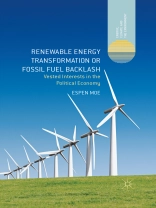Renewable energy is rising within an energy system dominated by powerful vested energy interests in fossil fuels, nuclear and electric utilities. Analyzing renewables in six very different countries, the author argues that it is the extent to which states have controlled these vested interests that determines the success or failure of renewables.
Tabla de materias
1. Introduction
2. Japan: No Structural Change, Save For A Structural Shock? Vested Interests Pre- And Post-Fukushima
3. China: No Structural Transformation, But Full Speed Ahead. Or…?
4. US Renewable Energy: Doing (Reasonably) Well, Despite The State Rather Than Because Of It
5. Social And Political Consensus Setting Germany On A Course For Structural Change, Or Germany At A Crossroads?
6. Denmark: A Successful Case Of Structural Change? Wind Power On The Inside Of The System
7. Norway: A Petro-Industrial Complex Leaving Little Room For Structural Change
8. Conclusions
Sobre el autor
Espen Moe is Associate Professor at the Norwegian University of Science and Technology, Norway. He received his doctorate in political science from the University of California, Los Angeles, USA. He is the author of Governance, Growth and Global Leadership (2007) and editor of The Political Economy of Renewable Energy and Energy Security (with P. Midford, 2014).












